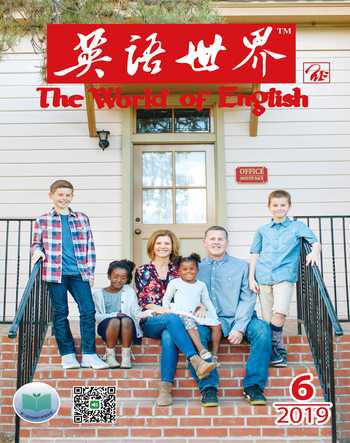Chinese Parents Video Game Lets You Be a Tiger Mum or a Driven Dad《中国式家长》让你做一次“虎爸虎妈”
2019-09-10卡洛琳·张雷蒙德·钟付小燕
卡洛琳·张 雷蒙德·钟 付小燕
You want your children to do well in school. You want them to have nice friends and interesting hobbies and to not go out with creeps. You may even want them to be happy.
But in this computer game, you can always start over with a new digital child if things don’t work out as planned.
A new game in China puts players in control of those most fearsome of characters: Mum and Dad. The mission? Raise a son or daughter from cradle to college.
In a nation of famously demanding, scolding and, yes, sometimes loving mothers and fathers, the game, Chinese Parents, is a hit. Since its release in September last year, it has found a huge audience on Steam, an online marketplace run by American game maker Valve. There are no official figures for how many people have downloaded the game, but it has provoked heated discussion online, while earning tens of thousands of reviews.
Yang Ge Yilang, a founder of Moyuwan Games, the independent studio that developed Chinese Parents, said he hoped to produce an English version this year.
The success of the game does not appear to be driven by people hoping to exact1 revenge for their own upbringings. Quite the opposite: Some fans have written that, by letting them experience childhood from their parents’ perspective, it had moved them to tears.
“I used to not understand many things my mum made me do when I was little,” said Kang Shenghao, 19, a professional blogger in the north-eastern city of Qinhuangdao. “But when I play the game and try to boost up figures for my son so he can unlock more achievements and marry the prettiest girl in school, I start to understand my parents more.”
All the joys and trials of raising children are here. Players choose between pushing their digital progeny2 to attain conventional success and allowing them some semblance3 of childhood innocence. They must give career guidance and endure (just barely) their teenager’s first dates. Everything leads up to the gaokao, the highly competitive college entrance exam that decides the fortunes of so many young Chinese people.
Virtual offspring
Yang said he also hoped to make a smartphone version of the game that allowed players to see how their virtual offspring stack up against those of their friends. Chinese parents love nothing more than boasting to their peers about how wonderful their children are.
For many decades, an official one-child policy meant that Chinese boys and girls carried the entire weight of their parents’ hopes for betterment. Population controls have eased (though the game’s children do not have siblings) and economic growth has created more opportunities for advancement. Scoring well on the gaokao is no longer the only ticket to a brighter future. Parents today are more likely to wonder whether unhealthy amounts of stress are turning their children into emotionally dampened4 automatons.
In Chinese Parents, a virtual child’s life unfolds over 48 rounds. In each round, players arrange courses and activities—piano lessons, swim classes, creative writing, coding and more. You can also buy gifts: ice-cream, toys, even Learn to Speak with Jack Ma, a book featuring the billionaire co-founder of the Chinese e-commerce giant Alibaba.
These choices shape how your child develops along six dimensions: intelligence, emotional intelligence, physical fitness, imagination, memory and charm.
A bar on the screen reflects how much psychological pressure the child is feeling. Pile on too much schoolwork, and the child may crack. But don’t let your score for “parental satisfaction” fall too low, either. Another score captures the concept of “face”, supremely important in Chinese culture. If a child loses face by doing badly in school, a summer trip to Europe could be cancelled.
Myriad career possibilities
A child’s final scores determine what happens after he or she leaves home. There are more than 200 colleges, including vocational schools and elite universities, that might offer a spot. The socially adept have their pick of compatible mates. There are myriad career possibilities: taxi driver, celebrity author, e-commerce mogul, Beyonce.
The earliest version of Chinese Parents gave players only the option of raising a son. In the current version, those who choose to have a daughter get reminders about attitudes that remain common in China. Her virtual grandmother says girls don’t need to do as well as boys in school. Her mother says that for a girl, the ultimate goal of hard work is to marry a good man.
‘Race that never ends’
Chinese Parents does not end when the digital child is grown. If he or she ends up with good character scores and a solid education and career, the next generation in the game starts out with better character scores.
Kong Qingxun, a 21-year-old blockchain entrepreneur in the southern city of Guangzhou, has raised eight generations of sons in the game. He let the first boy play lots of soccer and video games. But he didn’t get into college, so Kong changed his approach.
He drove his next son hard in school, earning him admission to the famed Tsinghua University in Beijing. From then on, it was easier for Kong to keep his boys on a path to accomplishment. By the seventh or eighth generation, his children were so gifted that they could goof off5 yet still excel academically and date pretty girls.
This feels true to life, Kong said.
“At the beginning, you think it’s just a 100-metre run,” he said, referring to life. “Then you realise it’s a marathon. And finally you understand it’s a relay race that never ends.”
你希望自己的孩子在学校表现出色,希望他们有不错的朋友和有趣的爱好,不要和讨厌的人交往。你甚至可能希望他们快乐。
但是在这款电脑游戏中,如果事情没有按计划进行,系统总是能生成一个新的虚拟孩子让你从头再来。
中国的一款新游戏让玩家可以控制最可怕的角色:爸爸和妈妈。任务嘛,就是要把儿子或女儿从摇篮抚养到上大学。
中国的父母以严苛而闻名,当然,严中有爱,在中国,这款名为《中国式家长》的游戏大受欢迎。自从去年9月发行以来,它在美国游戏制造商维尔福公司运营的游戏平台Steam上获得了大量用户。虽然还没有官方数据显示究竟有多少人下载了这款游戏,但它已在网上引发了热烈讨论,并获得了数万条评论。
《中国式家长》的开发者是独立工作室“墨鱼玩”,工作室创始人杨葛一郎说,他希望今年能推出英文版。
这款游戏的成功似乎并不是因为人们想用它来发泄自己成长过程中的不满。恰恰相反:一些粉丝写道,这款游戏让他们可以从家长的角度来体验童年,把他们感动哭了。
“小时候妈妈让我做的很多事情我都不理解。”19岁的康胜浩(音)说,他是中国东北部城市秦皇岛的一名自媒体博主,“玩这个游戏,我得努力提升‘儿子’的属性数值,让他能解锁更多成就、娶到校花,我开始更理解父母了。”
游戏里要经历养育孩子的所有欢乐和磨难。玩家需要在逼迫他们的孩子获得传统的成功和让他们保留一些童真之间做出选择。他们需要为孩子提供职业指导,勉强忍受他们十几岁孩子的第一次约会。所有的一切都是为了高考(即高等院校入学考试),因为高考竞争激烈,决定着众多中国年轻人的命运。
虚拟子女
杨葛一郎说,他还希望推出一款手游版《中国式家长》,让玩家可以看到自己的“子女”与朋友们的“子女”相比如何。中国家长最喜欢的莫过于向同龄人吹嘘自己的孩子有多棒。
中国曾实行了几十年的独生子女政策,这意味着中国的男孩女孩们肩负着父母对美好生活的全部期许。现在,政府对人口的控制已有所放松(不过这个游戏里的孩子没有兄弟姐妹),经济增长也为人们创造了更多发展机会。在高考中取得好成绩不再是通向光明未来的唯一途径。如今的父母可能更想知道,过重的压力是否会让孩子变成情绪压抑的机器人。
在《中国式家长》中,孩子的生活在48回合游戏中展开。每一回合中,玩家都要给孩子安排课程和活动——钢琴课、游泳课、创意写作、编程,等等。你还可以给孩子买礼物:冰激凌、玩具,甚至是《跟马云学口才》——这本书的主角是中国电子商务巨头阿里巴巴的联合创始人、亿万富翁马云。
这些选择将塑造孩子在六个方面的发展:智商、情商、体魄、想象力、记忆力和魅力。
游戏过程中,屏幕上会有反映孩子心理状况的压力值。给孩子太多的功课,他可能会崩溃。但也不要让你的“父母满意度”分数降得太低。还有一个属性体现的是“面子”这个概念,这在中国文化中极为重要。如果孩子因为成绩不好丢了面子,暑假去欧洲的旅行就可能被取消。
无数的职业可能性
孩子各项属性的最终得分决定了他/她长大后的结局。游戏中有200多所學院,包括职业学校和精英大学,孩子可能会考入其中一所。善于社交的人可任意挑选合适的伴侣。职业选择多种多样:出租车司机、著名作家、电子商务巨头,还可以成为碧昂斯。
在最早版本的《中国式家长》中,玩家只能选择养儿子。在最新版中,选择养女儿的会得到提醒,内容是中国仍然普遍存在的观念。孩子的“奶奶”会说,女孩子在学校里用不着学得和男孩子一样好。孩子的“妈妈”会说,对一个女孩来说,努力工作最终是为了嫁得好。
“永不结束的比赛”
这款游戏并没有在虚拟孩子长大之后结束。如果孩子最终拥有良好的性格属性、良好的教育和职业背景,那么游戏中的下一代从一开始就有较好的性格属性。
广州的区块链企业家、21岁的孔庆勋(音)已经在游戏中养育了八代儿子。他让第一代的儿子尽情踢足球、玩电子游戏,结果孩子没考上大学,所以孔庆勋改变了做法。
他给第二代儿子加大了学习压力,让他考上了清华大学。从那以后,孔庆勋让孩子们走上成功之路就变得容易多了。到了第七代或第八代,他的孩子们已非常有天赋,即使不努力学习成绩也出类拔萃,还可以和漂亮女孩谈恋爱。
孔庆勋说,这款游戏很像真实的生活。
“开始时,你会觉得它只是百米赛跑。”他指的是人生,“后来你发现它是一场马拉松,最后你会明白,它是一场永无休止的接力赛。”
(译者为“《英语世界》杯”翻译大赛获奖选手)
